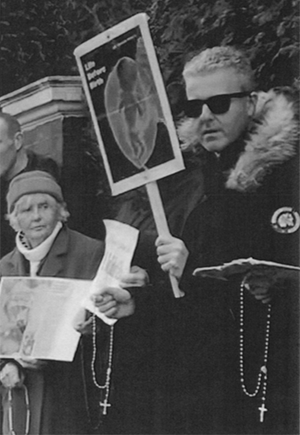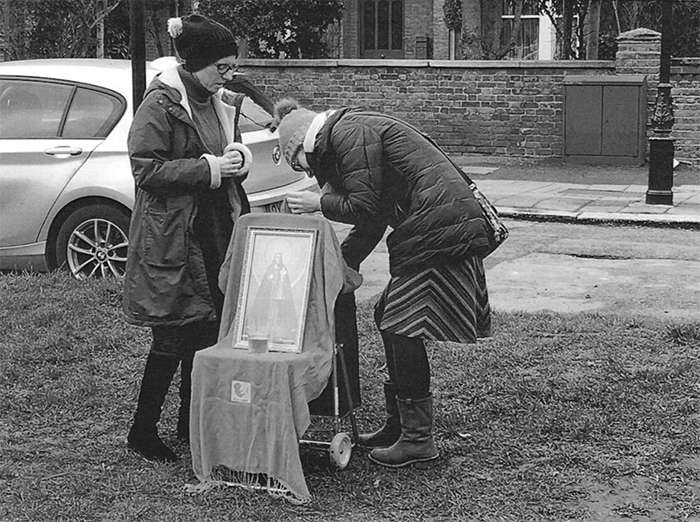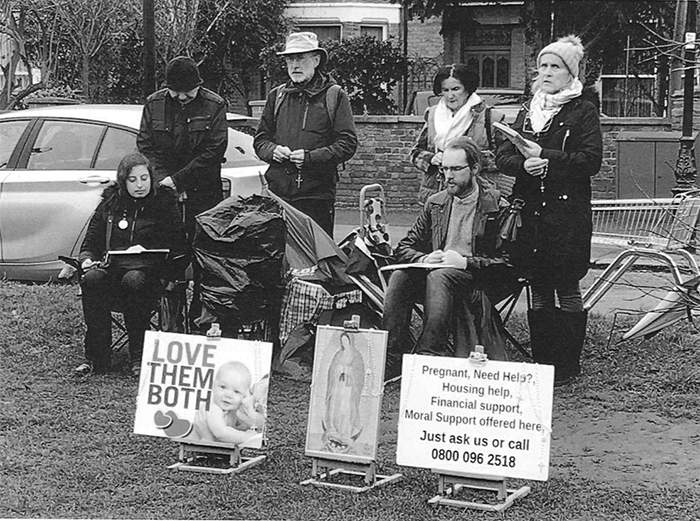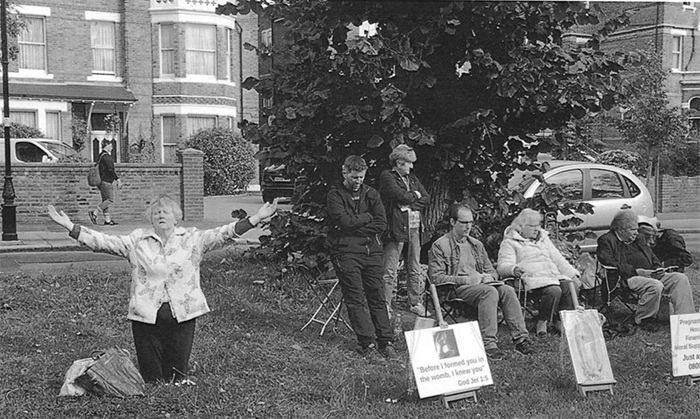3 Feb 2025 | Americas, News and features, United States, Volume 53.04 Winter 2024
This article first appeared in Volume 53, Issue 4 of our print edition of Index on Censorship, titled Unsung Heroes: How musicians are raising their voices against oppression. Read more about the issue here. The issue was published on 12 December 2024.
Big technology companies have enormous and outsized power. They control what information we can share and how, and demonstrate little transparency or accountability to users about what they are doing. They are too often permitted to set their own arbitrary standards, governing what we can and can’t say on social media, and how and to whom these ever-shifting rules apply. In no area is this more evident than in the battle between those who want to seek out and criminalise women for having an abortion and those who want to protect women’s right to choose.
In recent years, technology has dramatically altered the abortion landscape for women in the USA. It is now possible to order safe and effective abortion pills online and find accurate information about how to use those pills. This represents an unprecedented and world-changing expansion of women’s privacy and freedom. Thanks to improved access to medication, far fewer women will die or be traumatised, despite the US Supreme Court’s 2022 decision to strip the country’s women of federally guaranteed abortion rights. But women’s new-found abortion freedoms are under threat from powerful people who oppose privacy, freedom and safety for women, and corporatists who put business interests above human rights.
With President Donald Trump’s re-election things may be about to become a whole lot worse.
In March 2024, eight months before the election, I attended Visions for a Digital Future: Combating Online Suppression of Abortion Information, a panel discussion hosted by a coalition of rights and safe abortion access organisations including Amnesty International USA, Plan C, the Universal Access Project and Women on Web, along with experts from Le Centre ODAS and Fòs Feminista.
The panellists warned that tech companies were already suppressing information about reproductive health, either deliberately and as a matter of policy, or accidentally, such as when posts containing legitimate medical information trigger filters meant to block other kinds of content. Remedies have been piecemeal. Some organisations have been able to get accounts reinstated after meeting with contacts at Meta, but there is no democratic and transparent way of determining who gets access to vital medical information.
In one very recent case, Meta temporarily shut down the advertising account of Plan C, a group that provides up-to-date information on how US residents access abortion pills online, days before the US election, over claims of “inauthentic behaviour”.
European lawmakers have already taken steps to bring Big Tech companies to heel. They have done so via laws like the EU’s Digital Markets Act, a 2022 law which, among other things, requires large tech companies to get users’ consent before tracking them for advertising purposes; and the European Media Freedom Act (EMFA), which went into effect earlier this year, preventing large online platforms such as Facebook, X and Instagram from arbitrarily restricting or deleting independent media content.
Despite growing pressure from large parts of civil society, the USA has yet to pass federal legislation to meaningfully regulate Big Tech. Under a Trump presidency, the federal government is likely to go one step further and ask tech companies to use the data they hold to assist state and local law enforcement in tracking, prosecuting and jailing women for seeking abortions.
Some of the president-elect’s most prominent supporters are anti-feminist tech executives like Elon Musk, the richest man in the world and an ardent foe of government regulation (of corporations); venture capitalist Peter Thiel, who has questioned the wisdom of ever allowing women to vote; and Blake Masters, failed congressional candidate and chief operations officer of Thiel Capital (Thiel’s venture capital investment firm). All three have either previously expressed personal support for at least some level of abortion restriction or given large sums of money to politicians committed to restricting it.
Knowing it was a liability for him, Trump made confusing and contradictory statements about abortion on the campaign trail: once pro-choice, he bragged about having appointed the Supreme Court justices who overturned Roe v Wade.
By contrast, Vice President-elect JD Vance is an open theocrat who has pressured federal regulators to rescind a Biden administration rule that prevents police from accessing the private medical records of women who cross state lines to get reproductive health care, according to investigative news outlet The Lever.
Project 2025, the 900-plus-page handbook assembled by the right- wing Heritage Foundation and drafted in part by dozens of former Trump administration officials, indicates that a second Trump administration will seek to increase federal surveillance of pregnant people nationwide. They will most likely do this partly by requiring states to report abortion data and cutting federal funding to those that don’t comply. That data could put women and health care providers in serious danger of prosecution and/ or jail time. State law enforcement officials could pressure or compel tech companies to collect and share it.
This has already happened in the USA under a Democratic administration. Facebook’s 2022 decision to comply with a Nebraska police officer’s request for private data enabled the state to try, as an adult, a 17-year-old girl facing criminal charges for ending a pregnancy. Facebook handed over private messages the girl and her mother had exchanged in which the two discussed obtaining abortion pills, according to The Guardian.
The extent of the data Facebook handed over is unclear, but it’s apparent that companies like Facebook’s parent company Meta cannot be trusted to safeguard users’ privacy. Many of the largest tech companies in the world have refused to clarify how they will handle law enforcement requests for abortion-related data. While Meta does not allow users to gift or sell pharmaceuticals on its platform, it does, in theory, allow them to share information about how to access abortion pills, although enforcement of that policy has been inconsistent and non-transparent.
One ray of hope is that there’s a small chance that Trump will retain Lina Khan, Biden’s pick for chair of the US Federal Trade Commission (FTC). Khan has advocated for restraining the tech industry’s power and is seen as a threat. Days before the election, Musk wrote on X that Khan “will be fired soon.” Yet Vance has defended Khan, saying in a recent television interview that “she’s been very smart about trying to go after some of these big tech companies that monopolise what we’re allowed to say in our own country.”
Best known as an anti-monopolist, Khan has brought lawsuits against data brokers trafficking in geolocation data, a crucial bulwark against efforts by anti-abortion prosecutors to obtain women’s private medical data. This is important because in 2023, 19 Republican attorneys general in states that criminalised abortion demanded access to women’s private medical records in order to determine whether they had travelled out of state for care.
Under Khan, the FTC also cracked down on companies that extracted and misused customers’ private data. Browsing and location data of the kind these companies were gathering can provide intimate details of a person’s life, from their religious and political affiliations and sexual proclivities to their private medical decisions. Companies, knowing that most people would object to having this kind of data collected and shared, often hide what they are doing or mislead users about the extent of it.
It’s not yet clear what Trump’s top priorities will be as president, or who will have his ear. On the question of Khan, it seems likelier that he’ll take his cues from an oligarch like Musk than from his own vice president. As Politico recently noted Vance will have “little agenda-setting power of his own” in the new administration. Occasional anti-Big Tech rhetoric notwithstanding, neither Trump nor Vance cares about protecting women’s privacy. If Khan is fired, it’s extremely unlikely that any member of the Trump administration will take measures to safeguard medical data. State and local authorities will have to do everything in their power to pressure or require these companies to clarify why they are suppressing abortion-related content, and push them to fight requests that violate users’ privacy in court.
Authorities should also push or force tech companies to take measures – such as not collecting certain data in the first place or making it more secure – that would make it difficult or impossible to comply with law enforcement requests designed to punish women for exercising a right recognised by most Americans and international law. Failure to do so will jeopardise women’s lives, health and freedom.
1 Jul 2022 | Opinion, Russia, Ruth's blog, United Kingdom
Index on Censorship was launched in the early 1970s. In theory the world was a very different place, but in recent days the news does feel a little like déjà vu.
Fifty years ago, the world was split into two main camps – the West and the Soviet bloc – with a Cold War dominating geo-politics in the hope of preventing a hot war.
In 1972 the inflation rate in the UK was 7.13%.
The wider economic situation in Britain led to significant industrial action, with 23,909,000 working days affected in that same year.
China was still diplomatically isolated – although 1972 saw the first public efforts of engagement with the West, when President Nixon visited Beijing.
Back in the US, women were demanding rights over their bodies, with Roe vs Wade being upheld by the US Supreme Court the following year.
As Mark Twain said: “History doesn’t repeat – but it does rhyme.”
I really want to believe that as democratic societies we are on a progressive arc – that governments, and more importantly their electorate, over time becomes more liberal, more tolerant, and more enlightened. That is after all why I am an advocate of freedom of expression – the more people can debate and engage and argue, the better our collective societies become.
The events of 2022, so far, are challenging this core belief. And it would be easy to roll over and believe that the end is nigh. But we can’t and we won’t. I believe in people – I believe in the power of politics and most importantly I believe that our core democratic values overcome tyranny.
But there is one thing that we need to embrace as the world seems bleak. Nothing happens in isolation and our core values are not things that we can be complacent about.
Democratic leaders let our global institutions atrophy – our post-Covid world is a direct consequence of failing to invest in the global post-war institutions which we established to protect international law and to provide a place for global diplomacy.
The attack on women’s rights in the US hasn’t happened by accident, it’s a consequence of people voting – or not voting. Turnout in the 2016 general election in the US was less than 60% and that gave us Donald Trump.
So, there is a lesson to be learned from what is happening in democratic societies across the world – and that lesson isn’t to walk away, it is to get more involved. It’s to demand more and to demand better of those that seek to lead us. It’s to exercise every campaigning option that is given to us and protected for us by our rights to freedom of expression. And, most crucially it is to make a stand against those politicians that seek to cultivate hate and division – because their success leads to attacks on our core human rights – including what we do to our own bodies.
3 Nov 2020 | News and features
[vc_row][vc_column][vc_column_text]

A Women’s March in 2017. Credit: Mark Dixon/Flickr
“I had a second trimester abortion,” tweeted Erica Goldblatt Hyatt, a Canadian living in the USA. “Our son never formed an airway. Had he survived birth he would have been brain dead. That wasn’t the life I wanted for him. It was the first true parenting decision I ever made.”
Goldblatt Hyatt’s story was included in a CNN article, along with stories from a mother of two who didn’t want more children and a woman who got pregnant at 16 with no family support, about the reasons women have abortions.
Since the passing of Roe v Wade in the Supreme Court in 1973, abortion has been enshrined in law in the USA. Some states have restrictions on access to abortion, but the ruling that it is a legal right has remained in place.
The passing of Ruth Bader Ginsburg in September, and her replacement by Amy Coney Barrett, has fuelled the fire of panic in women that this right could soon be snatched away, a panic they have felt since 2016 when Donald Trump said that if he is able to select enough justices for the bench, over-turning Roe v Wade “will happen automatically”.
The USA is not the only country where reproductive rights are being dismantled. Mass protests have broken out in Poland over the last few weeks after the constitutional court ruled that, even in the case of severe foetal abnormalities, women will be forced by law to carry the pregnancy to term. This is a further encroachment on reproductive freedom in a country that already has some of the most restrictive abortion laws in Europe.
The women of Northern Ireland are also facing barriers to reproductive freedom. Despite abortion being decriminalised in October 2019, access to clinics is severely lacking, prompting the Royal College of Obstetricians and Gynaecologists to write a letter, sections of which were published by the Independent on 26 October, warning of the risks to women.
“There have already been at least two cases of attempted suicide by women in Northern Ireland unable to access care,” it says, adding that there has been a dramatic increase in women “turning to unregulated methods of abortion during the pandemic.”
Reproductive rights are a freedom of expression issue. We do not only express ourselves verbally and artistically, we express ourselves through the choices we make about how we live our lives and what happens to our bodies. The decisions about when, if ever, to become a mother, and to how many children, are some of the biggest a woman can make. When states take control of this decision, they are taking control of our self-expression.
This is not to say that these decisions cannot be discussed and debated. Debate is at the heart of freedom of expression and that extends to the topic of abortion. People should be allowed to talk about the questions surrounding it, such as “when does life start?” For some it starts at the moment of conception, meaning abortion at any stage, even the very early weeks, would constitute ending a life. But this is not a consensus. And even if life does start at conception, that would not necessarily mean that abortion should be banned. After all, there are all kinds of practises that we allow as a society even if we question them morally because we believe banning them would ultimately go against freedom and autonomy.
Pro-life advocates must of course have their right to this view respected, and no one should force them to abort. But equally people attempting to force their beliefs on others, and control their actions to be in line with these beliefs, is when the defenders of freedom of expression must step in.
It should go without saying that the consequences of being forced to have a child are far-reaching. There’s the toll on mental health for one. According to research by scientists at King’s College London one in four pregnant women suffer from mental health problems. This can be even more extreme for those in unwanted pregnancies. In 2017 a young woman, who became known as Ms Y, sued the official health service in Ireland after she was not only denied an abortion but held against her will and forced medication to prolong the pregnancy. She had arrived in Ireland in 2014 seeking asylum and soon discovered she was pregnant. She said she’d been raped and was suicidal because of the pregnancy.
Research also shows that having a baby can hold a woman’s career back six years. Inflicting career disruptions on women by forcing them to continue with unwanted pregnancies is an infringement on their self-expression in the workplace that can have long-spanning repercussions. And then there are all the negative impacts it can have on relationships, finances, social support networks – the list could go on. None of these are trivial matters. Rather they’re all choices that are part of our free expression.
The Polish ruling also highlights that many abortions are because either the baby or the mother, or both, are seriously ill. Abortion is not always a lifestyle choice. It is often a very traumatic decision a woman is forced to make about an intended pregnancy. Heart-breaking as these decisions undoubtedly are, the most profound forms of expression are often the choices we make about our health and that of our families.
Incidentally, as is often the case with censoring behaviour, removing someone’s choice can actually be counter-productive. A study by the National Library of Medicine concluded that women who had had an abortion were more likely to have an intended pregnancy within the next five years than women forced to continue with an unwanted pregnancy. Diane Greene Foster, one of the academics who conducted the study, concluded: “Being able to access abortion gives women the opportunity to have a child later with the right partner, at the right time”. She added that a woman who is denied an abortion is likely to “face diminished opportunities to achieve other life goals, gain secure financial footing, and have a child she can cherish and support”.
Remaining childless, or having children with the right partner when it is the right time to do so, is an umbrella of self-expression under which so many other forms of expression shelter; expression through work, through lifestyle choices, through parenting ability. It is a form of expression which must remain in the hands of individuals and be kept out of the grips of the state.[/vc_column_text][/vc_column][/vc_row]
15 Aug 2018 | News and features
[vc_row][vc_column][vc_column_text]
During her time as director of the Manifesto Club, Josie Appleton has dealt with many Community Protection Notice and Public Space Protection Orders being served for non-criminal reasons.
She has dealt with PSPOs for rough sleeping, begging, annoying dogs and even people moving rocks. In her view, these are cases that should be dealt with by the interested parties without the involvement local government or police.
“Once you give the state power, you do not defend victims, you make people victims of the state and that is what happening now,” she says.
The power that Appleton is referring to comes from the Anti-Social Behaviour, Crime and Policing Act 2014, which was introduced after a government white paper — Putting Victims First – More Effective Responses To Anti-Social Behaviour — found that “in some local areas, the focus is still too much on ‘management’ of individuals causing anti-social behaviour, rather than working quickly to stop problems causing serious harm to victims”. The government’s solution was to give local authorities a broad range of powers to limit people’s movements and expression in public places under the guise of stopping anti-social behaviour.

Photograph of pro-life protest distributed at Ealing Council meeting, 10 April 2018.
Two sections under the act have already been used to create orders that limit people’s freedom of expression: part two on Criminal Behaviour Orders and part four on community protection.
CBOs allow prosecutors to take an injunction against a person who has already been convicted of a crime. If the “court is satisfied, beyond reasonable doubt, that the offender has engaged in behaviour that caused or was likely to cause harassment, alarm or distress to any person,” then an order will prohibit certain activities, or require the offender to take specific actions.
In June, London’s Metropolitan Police sought and obtained a CBO preventing five members of 1011, a gang based in Ladbroke Grove, London, from making drill music, a style of rap known for its dark or violent lyrics. The order prohibits the individuals from making music videos about violence or other gang members, and from posting any songs without notifying the police in advance.
Although the court can consider evidence regarding CBOs, “it does not matter whether the evidence would have been admissible… evidence could include hearsay or bad character evidence”. This means that although violating a CBO can lead to a prison sentence up to five years, the burden of proof is lower than that required in other criminal cases brought before the court.
The other order under the act that has been used to limit freedom of expression is the Public Space Protection Order.
The PSPO is a replacement for three previous orders — Gating Orders, Designated Public Place Orders and Dog Control Orders — but it can be used for a broader range of incidents. It states that if activities carried out in an area have a “detrimental effect on the quality of life of those in the locality,” then local governments can take restrictive action.
Appleton believes one of the problems with the order is that it is so vague that the government can use it to prohibit any activity they disagree with or use it to target a specific group. “[I]s, or is likely to be” is repeated several times, meaning all that is needed is a suspicion that an action could cause harm.
While the law gives wide latitude to the local councils, it does require that there is a “particular regard to the rights of freedom of expression and freedom of assembly set out in articles 10 and 11” of the European Convention on Human Rights when deciding whether to create a PSPO.
Regardless, on 10 April Ealing Council in London passed a PSPO that restricted the actions of anti-abortion protesters around a Marie Stopes clinic. The PSPO was introduced to protect women entering the clinic. In a report written by Ealing’s Safer Community Team, it is reported that the protesters often talked to them and tried to hand them items such as rosaries, pamphlets and models of foetuses. Sometimes the pro-life groups were joined by pro-choice protesters which created a tense situation.

Photograph of pro-life protest distributed at Ealing Council meeting, 10 April 2018.
The PSPO created a buffer zone moving the protesters 100 metres away from the clinic, meaning they are too far away to talk to women entering the clinic.
The PSPO prohibits “protesting, namely engaging in any act of approval/disapproval or attempted act of approval/disapproval, with respect to issues related to abortion services, by any means. This includes but is not limited to graphic, verbal or written means, prayer or counselling”.
A report produced by the Ealing’s Safer Community Team states that they did take into account articles 8, 9, 10, 11 and 14 of ECHR, which include protections on religious belief, freedom of expression and freedom of assembly. However, they ruled that it was necessary to interfere with these rights in order to protect visitors to the clinic under the Equality Act of 2010. It also found these women to be a protected group under article 8 of ECHR (the right to private and family life).
The report also states that despite the fact that the protesters haven’t done anything worthy of persecution, council members were advised that it was not “a reason to rule out the possibility that the activities are having the requisite detrimental effect”.
Clare Mulvany, a spokesperson for the pro-life group Be Here For Me, told Index on Censorship: “The Council is undoubtedly entitled to take steps to protect women entering abortion clinics from genuine harassment and intimidation. There is not any dispute about that. However, the difficulty here is that the buffer zone goes so far beyond what is reasonable or necessary to achieve that end.”
On PSPO, Putting Victims First states: “In keeping with the Government’s desire to devolve powers to local areas, the order would allow local authorities to make decisions without the burden of having to go through central Government.”

Photograph of pro-life protest distributed at Ealing Council meeting, 10 April 2018.
“Effective criminal justice can never be about giving more power with fewer checks and balances. It doesn’t work like that,” Appleton said. “The restrictions that exist for a very good reason, they guide authority down fair and rational lines of enforcement. Once you create a free for all you do not have better justice, you have complete chaos and that is what we have now.”
Under the Anti-Social Behaviour, Crime and Policing Act, interested parties only have six weeks to make an appeal to the High Court when a new PSPO is created and the appeal can only be made under the basis that the council did not have the authority to make the order or that they did not follow all the requirements when making the order. In addition, it can be enforced with on the spot fines, meaning people don’t have an opportunity to defend themselves in court.
Alina Dulgheriu, a pro-life advocate who says she was helped by protesters when she was pregnant, decided to fight the Ealing PSPO in the High Court. She believes the PSPO “is anti-choice because it removes the chance for women to get information about other help available to them”.
She lost the case in High Court and now has a Gofundme account to raise money for an appeal.
Appleton, who identified herself as pro-choice, said: “I think it is important that people who support free speech but who disagree with the protesters oppose these PSPOs because they’re making the point that it’s not about what you think about abortion, it’s what you think about freedom that counts and these PSPOs are a restriction on assembly and expression of view in a public place.”
Although both Mulvaney and Appleton recognise the problems with the act, their respective organisations don’t have the resources to effectively campaign against it.[/vc_column_text][/vc_column][/vc_row][vc_row][vc_column][vc_basic_grid post_type=”post” max_items=”4″ element_width=”6″ grid_id=”vc_gid:1534340349208-7fb1dab2-6b19-5″ taxonomies=”26321, 8883″][/vc_column][/vc_row]





